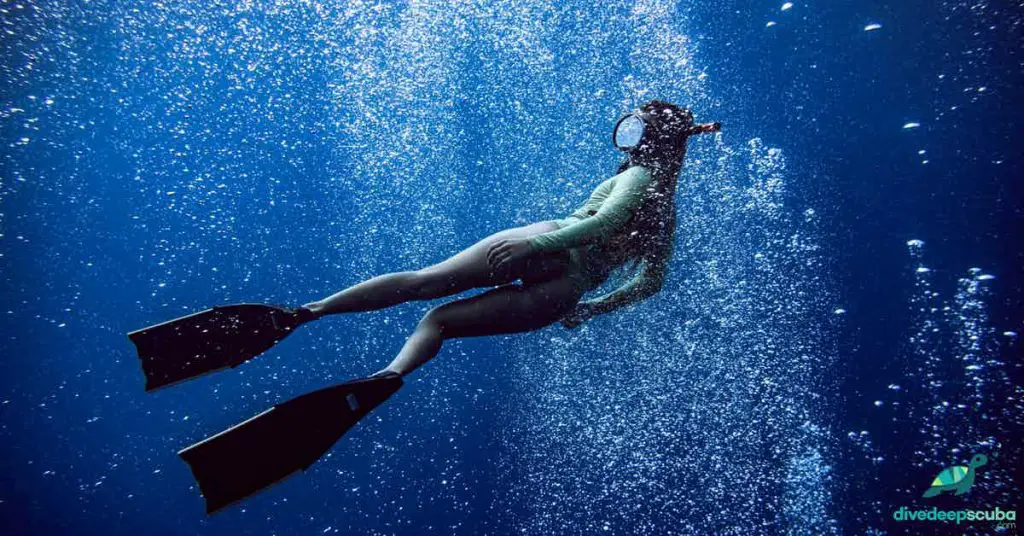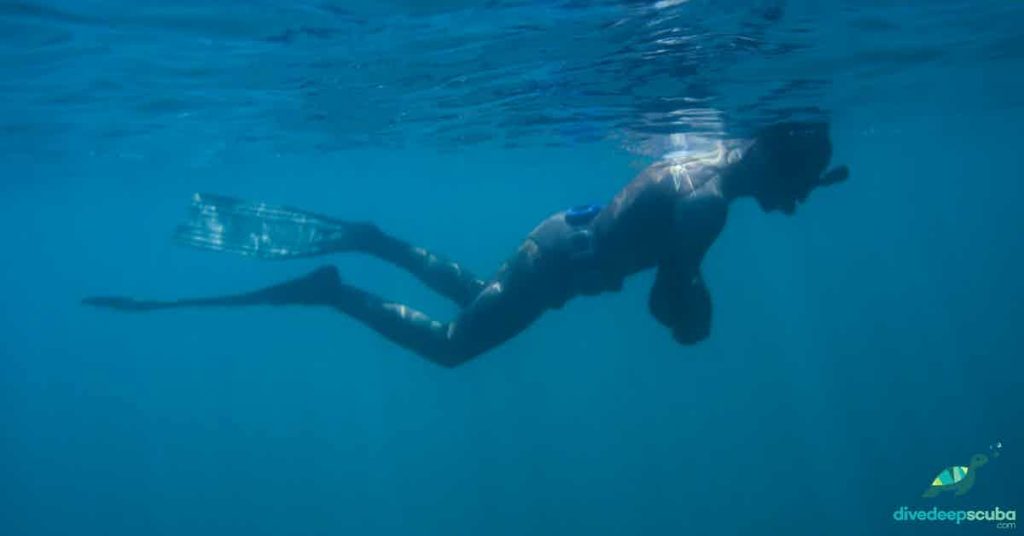Is Freediving Safe?
Yes! Freediving is known as a very safe sport, as long as you are diving with a buddy and within your limits. Of course, like all sports there are some risks, such as shallow water black outs, but these can be avoided!
While out on a Coral Reef, duck diving down to see the turtles, then popping back up to the surface has very minimal risks. However, as Freedivers begin to challenge themselves to dive longer and deeper, they should be aware of the potential risks that could occur.
So what are the risks? How should you deal with them? In this article, we are going to have a look at:
- The Risks Of Freediving
- Why You Should Never Hyperventilate Before A Dive
- You Should Never Dive Alone
- What To Do If Your Dive Buddy Experiences A Blackout
What Are The Risks Of Freediving?
Freediving risks include pressure-related risks such as:
- Eye Barotrauma
- Middle Ear Barotrauma
- Hood Squeeze
- Sinus Barotrauma
- Lung Barotrauma
- Nitrogen Narcosis
- Shallow Water Blackout
Freediving is considered relatively safe, and many of the risks associated with this sport can be avoided.
Lets get into some of these risks in a little more detail!
Eye Barotrauma
Eye Barotrauma is where the pressure increases within the mask, and the capillaries in the Freedivers eyeballs begin to burst.
I know… it sounds awful…
Luckily, this risk of Freediving can easily be avoided, by simply equalising your mask frequently! Easy!
Middle Ear Barotrauma
Middle Ear Barotrauma is ear damage, which can be extremely painful. Middle Ear Barotrauma can occur during the descent if the Freediver does not equalise the air spaces in their ears!
Equalising is taught within the beginner Freediving courses, therefore this injury can also be easily avoided!
Middle Ear Barotrauma is a little more complicated than simply just remembering to equalise. This is why you should not Freedive if you are congested, as this can prevent your ability to equalise.
Freediving with congestion is not only painful, but can increase the risk of Middle Ear Barotrauma and possibly even cause a Sinus Barotrauma.
If you wake up the morning of a Freedive and you’re congested, just skip the dive! Trust me! Wait until you are feeling better and your sinuses are clear, to ensure you are able to equalise!
Freediving is fantastic, but your health and safety is paramount.
Perhaps you felt fine before the freedive, but during the descent you struggle to equalise. Please do not try to force an equalisation too hard! You can cause more damage than it is worth and possibly put your Freediving on hold for even longer until it is better!

Hood Squeeze
Hood Squeeze can occur when there is air trapped between the outer ear and the inside of the hood. As the Freediver descends, this air space can become smaller, pulling on the eardrum and creating a sharp pain.
Hood Squeeze can be mitigated by ascending slowly and by ensuring there is no air trapped in your hood.
This is best done by punching very small holes in the hood to allow air to escape during the descent.
Lung Barotrauma
Lung Barotrauma can occur when the Freediver has insufficient diaphragm flexibility, is cold, or has dived beyond their residual lung volume.
As the pressure in the lungs increases, it is forced to be equalised by blood and tissue fluid which moves across the alveoli walls.
After surfacing from a dive, if you experience a huge urge to cough, or wheeze when breathing, it is possible that you have suffered a Lung Barotrauma.
This Freediving injury is quite serious, and Freedivers should stop all diving activities until they are fully recovered.
Shallow Water Blackout
Freediving or Shallow Water Blackouts are caused by the Freediver having such a low level of oxygen in their blood, that they lose consciousness.
This is the final risk we will discuss in this article, and it is probably one you have heard of before!
As Freedivers hold their breath, the level of Oxygen decreases and Carbon Dioxide increases. As Oxygen decreases below a certain point, this is detected by the brain and consciousness is lost.
In other words…the Freediver Blacks out.
It is known as a Shallow Water Blackout, as it usually occurs in shallow water towards the end of the dive.
As the Freediver is making their way back to the surface, the pressure from 10m to 0m halves (from 2 Bar to 1 Bar). Therefore, the air in the Freedivers lungs doubles in size, and there is a sudden drop in oxygen level, causing the Blackout.
All these risks and how to prevent them is taught in Freediving courses. That is why it is so important to get specialist training!
Blackouts are also why you should never hyperventilate on the surface before a dive.
Read on to find out why!
You Should Never Hyperventilate Before A Dive
Hyperventilating (over breathing on the surface) should never be performed before a dive, as hyperventilation is a major cause of blackouts!
Hyperventilating is the process of over-breathing on the surface. At first glance, you might think this is beneficial, as if it increases the level of Oxygen in your blood. However, in actual fact, it does not!
The normal saturation level of your blood is around 96-985, and a single breath can usually take it up to 100%.
Therefore, hyperventilating does not increase your Oxygen levels, but actually reduces Carbon Dioxide levels in the blood.
You most likely know about the process of our bodies using Oxygen and creating Carbon Dioxide.
While we exercise, we use Oxygen to create energy, and produce Carbon Dioxide as a Bi-Product. As we breathe, Oxygen is taken in, and Carbon Dioxide is expelled.
So what happens when Freedivers hold their breath?
During a dive, Oxygen is used, and Carbon dioxide begins to build up. As the level of Carbon Dioxide creeps up, it begins to cause the diver a huge urge to breathe, causing chest contractions and discomfort.
This is where you might be thinking, would hyperventilating not help reduce Carbon Dioxide levels and hold your breath for longer? Technically yes, but it should not be done!
This is extremely dangerous, and is the leading cause of blackouts!
If Carbon Dioxide levels are lower, the urge to breathe is delayed and Freedivers can be encouraged to stay deeper and longer than they can handle. Not enough Oxygen is left for them to return to the surface, and they can experience a Shallow Water Blackout.
It is now suggested, that a Freediver should do no more than 3-4 deep breaths before diving down.

Can I Freedive Alone?
No. You should never Freedive alone. This is an unwritten rule within the Freediving community. You should always Freedive with a buddy as a safety measure.
Although Freediving is a very safe sport when practised responsibly, there are some risks, which we have talked about above, such as blackouts.
While Freediving, you should have a trained, experienced dive buddy watching over you during your dive and your recovery time.
During Freediving courses, you will be accompanied by an Instructor, watching and helping you practice your new learnt skills!
As you move through Freediving courses and build up certifications, you might start planning your own Freedives. This is where it is crucial to remember, you should never dive alone. Make sure you plan to dive with an experienced Freediving buddy!
Freediving buddies are important. In the unfortunate case that you were to experience a blackout or any other first-aid issue listed above, your dive buddy can begin the recovery procedure.
What is the recover procedure I hear you ask?
Read below to find out what to do in an emergency Blackout situation!
What To Do If Your Buddy Blacks Out
If your buddy blacks out, recover the diver, remove the diver’s airways from the water, remove the mask and repeat the divers name, tap on his face and encourage them to breathe!
Freediving courses will train you in the unfortunate event that you have to recover your Freediving buddy from a Shallow Water Blackout.
Before acting as someones Freediving buddy, you should be trained by a professional on how to handle emergency situations.
We will not go into too much detail, but here are the basic steps of what you should do if your buddy blacks out:
- Dive down to rescue the diver
- Bring their head above the water, remove their mask and open their airways
- Repeat their name, try tapping their face lightly and encourage them to breathe
- Keep trying to get their attention, to regain their consciousness
- Stimulate the facial nerves by blowing lightly on their face, in attempt to encourage them to take a breath
- If they have not taken a breath yet, it is likely that their muscles are spasmed closed, restricting the windpipe. If this is the case, perform a safety breath, pinching their nose and blowing in their mouth.
- Hopefully this should bring them back to consciousness. If not, there is likely to be another issue. Evacuate the diver to the boat/land and perform emergency procedures.
Don’t Forget Your Dive Insurance!
Before you go out on any dive trip or holiday, it is essential to make sure you have insurance that covers you if something goes wrong. Check out our dive insurance article for more information.
Or go straight to these dive insurance company websites:
If you liked this article, please follow us on Instagram, Twitter and like our Facebook page
Final Thoughts
Freediving is known as a very safe sport. However, like most other sports, there are some risks! This is why you should never Freedive alone, always with a buddy!
Specialist training teaches Free divers how to dive safely, minimise such risks, and how to act when facing an unfortunate emergency.
Please share this article using the social media buttons!
